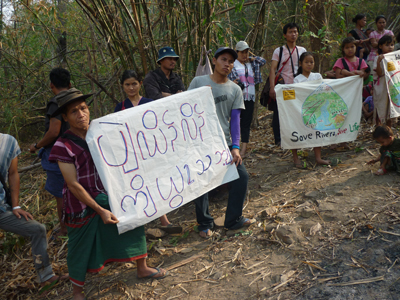Dam investment projects put peace at risk

An alliance of Karen community base organizations claim Chinese and Thai investment in the Hatgyi dam could undermine the ongoing peace negotiations between the Karen National Union (KNU) and the Burma government, destroying the Karen peoples’ fragile hope for peace.
Saw Paul, director of the coalition for sustainable rivers development, the Karen Rivers Watch (KRW) said.
“At this fragile stage of the ceasefire process, pushing ahead with the Hatgyi dam and other (mega development projects) will reignite conflict and could derail the talks. Investing in these projects is sabotaging the hopes of Karen people for lasting peace.”
The Karen Rivers Watch in a released statement said they are concerned the security around the dam sites could escalate into armed conflict.
“The increased Burma Army security around the dam sites and blatant disregard for concerns of impacted communities are heightening tensions, and throwing into doubt the government’s sincerity in conducting ceasefire talks.”
The KRW raised their concerns on March 14, at the International Day of Action for Rivers.
In 2009 the KNU stopped the Hatgyi Dam after strong protest by local people. But under pressure from China’s Sinohydro Corporation and the Electricity Generating Authority of Thailand (EGAT), in December 2011, the KNU allowed the investors to carry out surveys on the Hatgyi Dam, located in a conflict area on Salween River of Karen State.
Saw Paul said.
“We want the Salween River to flow freely as ever, especially during the peace talks between the KNU and the Burma government. We want the [investors] to stop their planned dams in Karen State and on the Salween River to avoid fueling tension and fighting between the Karen and the Burma Army.”
Saw Kyaw Moe, Quartermaster with the Karen National Defense Organization(KNDO), No.1 Battalion based near the Salween River, confirmed to Karen News that in recent days tension between the Burma Army and Karen units had increased.
“After the KNU leaders signed a ceasefire, Burma Army troops increased their activities in Ler Mu Plaw, Pa Gaw, Papu, Mae Ka Hta. They sent more soldiers and supplies. The Burma Army also sent more troops and one more battalion of Border Guard Force (BGF) to Hatgyi at Mae Pa. This forced us to respond by sending more of our troops to the dam site and to other places.”
If they continue their buildup of troops in the area it could see fighting start. We will fire at them if they walk out on the main road beyond a certain point.”
KNDO is a defense organization under the Karen National Union.
Karen Rivers Watch pointed out that conflict has already started in areas where investment projects are pushing ahead without the cooperation of local people.
“In February 2012, KNU troops arrested and fined workers from the Chinese company Myanmar Nature Energy Wave, demanding they stop building work on the Dah Thway Kyauk dam, which will flood five Karen villages near Dawei in southern Burma. Similar resentment is building against the Italian Thai Development company, for pushing ahead with the Taninthayi (Tenasserim) Dam, expected to export power to Thailand, and the Ka Loat Hta Dam, that will store water for the Dawei Special Economic Zone.”
On March 14, hundreds of local people from both sides of the Salween River, who will be affected by the Salween hydro power dams, gathered in Weigyi on the Burma side and Thu Moe Hta on the Thai side to stage their protest against the investors demanding they stop building hydro power projects along the Salween River.
As many as 200 Karen villagers gathered at Weigyi at the plan dam site, to pray according to their belief – Buddhist, Christian and Animist – for the dams not to be built and to keep the Salween River safe.
Naw Wah Day Nya, from Paw Ka Der village, spoke to Karen News.
“In 2004, we heard Thai would build a dam in Dagwin and Weigyi. We saw them coming for the survey. If they build the dam our village will be flooded and cause us many problems. We don’t accept their dam because it will take our living. If the dam is built, we have nowhere to go. We are also concerned that during the peace talks the Burma Army do not reduce their soldiers, it is not safe for us to return to our old village.”
Naw Wah Day Nya fled her old village more than a decade ago.
Saw Paul said investors have to consult with local people before the start projects that will affect their lives.
“Mega development projects such us dams, plantations and economic zone should provide information to local people on what the benefit and negative impacts will be and to include local people in the decision making process – before projects are started.”
Saw Paul said the Burma government should stop these large-scale investment projects to ensure investors meet acceptable international standards on the environment and local communities.
“The Burmese government should show its sincerity by halting all mega-development projects in ethnic areas until there is genuine peace and political reform which guarantees the rights of impacted communities.”




